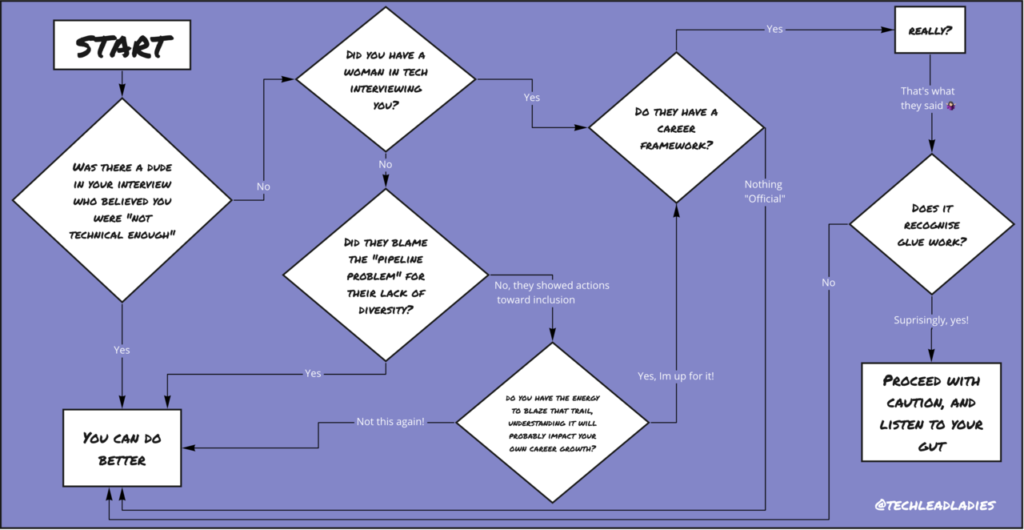
Be on the lookout in your next interview
As software engineers in the current market we find ourselves in hot demand and with the ability to build personal wealth, as large tech companies are now throwing cash at the skills shortage problem. Add to that women are an underrepresented, sought-after group and you are in a position to shop around for the best role, name your price and your working conditions.
Not only is it important to find a values-aligned company, but you need to find one you can thrive in, and this is the hard bit. Despite our best efforts, tech is still heavily dominated by men, which can create an environment that holds women back, or spits them out all together.
I have had a number of coaching conversations with women lately, wanting to know how to assess whether the company they are interviewing for will be inclusive and support their career growth. When you are interviewing for your next role, here are some ways to identify red flags, and assess whether it’s a culture you want to be part of.
How many women have interviewed you?
An engineer hired into one of my teams remarked to me how great it was to have women interview her at each stage of the process, and how this made more confident about joining our company. Despite her belief that this was a happy accident, I can assure you it was a very deliberate move. Having been involved in many a masculine-interview processes I know how important a sense of belonging is to me making a final decision about my next gig.
The first red flag is getting to interview number two and still not having spoken to a woman (apart from the recruiter). When I find myself in this situation I seek to find out what’s really going on behind the polished-recruiting facade.
Ask if you can be interviewed by one of their female developers (as senior and as tenured as possible)
During this interview ask her about her growth in the company and the career progression opportunities she has experienced. As a software dev manager, it is my practice that anyone who has been in an engineering team for 6 months or more should very clearly know how far away they are from promotion, what they need to learn and do to get there, and how the company is supporting them in that. If your interviewer is vague on these details, think very carefully about joining her.
Be careful to note that “having a mentor” and “getting promoted” are two very different things. The first means one person cares about her development, which is a start. The second means the company has reduced subjective assessment for promotions or unconscious bias is not holding her back: necessary for you to be able to grow in that role and be your authentic self.
Side note for male engineer leaders: If you have read this and now think “so all I need to do is make the one female dev we have do all the interviews!” you have missed the point. The tl;dr is No, and if you don’t know why then watch this talk by Tanya Reilly on Being Glue
What if they don’t have a female developer?
Even in this day and age, sadly this is not an uncommon scenario, and paints a very clear story on the value they place on diversity. Due to my experience, I know that a diverse team will outperform a pack of brogrammers every time so the excuse of “we just had to move fast” is a false-economy of unaware tech managers. If the company isn’t a small start up, well, they are even further from this being an excuse.
It’s important to know that it’s very rarely bad intent. On some level people kind of think they should have more women in the team because it’s “the right thing to do”: not because they implicitly understand what diversity can bring. And, because this is about you and not them, despite their good intentions, you want to go somewhere that deeply understands this and will give you an environment to thrive in.
Ask them what they are doing to level the gender imbalance in their engineering teams
This question usually gets responses that range from a awkward spluttering excuse about why either they have not thought about it or they don’t need to, through to an articulate response of how they understand the importance, and have done all they could before they launch into mansplaining to you how there are just no qualified women in tech (please!).
In my various engineering leader roles, I have put a lot of energy into deliberately building out diverse tech teams, and have still – at times – experienced the same gender imbalance in my own teams, so I understand how hard it is. (Well, it’s never been zero, but has dipped as low as 10% in engineering). The difference is, anyone interviewing for my teams knows exactly what we are doing at the time to hire and retain women in the tech space.
Use your intuition to tell you if the answer you get is good enough, and something you are comfortable living with.
They seem like okay guys though
Great! You have an offer in hand, you feel like they are values aligned, and have deemed you skilled enough. You haven’t picked up on any red flags (besides the no women thing). You need to work out if you can thrive in that environment as a software engineer. Do you want to be the trailblazer for women in that company? Do you want to be the one to call out the micro-aggressions you experience, the non-inclusive language they use, the flaws in their hiring and promotion processes? Do you want to be the one having to ‘fix diversity’ or would you rather spend your time and energy building your tech skills? The answer might be yes, and if you have established yourself in your career, and have the support of a great network like Tech Leading Ladies, you may want to take this on.
How do I find a role like that?
Use your network! Lots of Women in Tech groups have job boards, with roles that come endorsed by other members. Ask your friends and ex-colleagues if they are hiring.
Ultimately, trust your gut. If something feels wrong, reach out to a trusted mentor or friend and talk it through. So many women in tech end up stuck in jobs without growth opportunities, dealing with micro-aggressions and having to navigate the impacts of unconscious bias, before leaving tech all together.
Your ability to succeed starts with the right employer.


